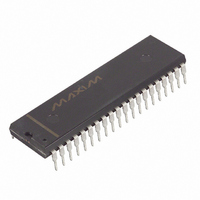DS2180A Maxim Integrated Products, DS2180A Datasheet - Page 2

DS2180A
Manufacturer Part Number
DS2180A
Description
IC TRANSCEIVER T1 40-DIP
Manufacturer
Maxim Integrated Products
Datasheet
1.DS2180A.pdf
(35 pages)
Specifications of DS2180A
Function
Transceiver
Interface
T1
Number Of Circuits
1
Voltage - Supply
4.5 V ~ 5.5 V
Current - Supply
3mA
Operating Temperature
0°C ~ 70°C
Mounting Type
Through Hole
Package / Case
40-DIP (0.600", 15.24mm)
Includes
Alarm Generation and Detection, B7 Stuffing Mode, B8ZS Mode, Error Detection and Counter, "Hardware" Mode, Transparent Mode
Lead Free Status / RoHS Status
Contains lead / RoHS non-compliant
Power (watts)
-
Available stocks
Company
Part Number
Manufacturer
Quantity
Price
Part Number:
DS2180A
Manufacturer:
DALLAS
Quantity:
20 000
Company:
Part Number:
DS2180A+
Manufacturer:
Exar
Quantity:
207
Company:
Part Number:
DS2180AQ
Manufacturer:
DALLAS
Quantity:
5 510
Part Number:
DS2180AQ
Manufacturer:
DALLAS
Quantity:
20 000
Company:
Part Number:
DS2180AQ+
Manufacturer:
Maxim Integrated Products
Quantity:
135
Company:
Part Number:
DS2180AQ+
Manufacturer:
Maxim
Quantity:
24
Company:
Part Number:
DS2180AQ+T&R
Manufacturer:
Maxim Integrated
Quantity:
10 000
DS1386/DS1386P
DESCRIPTION
The DS2180A is a monolithic CMOS device designed to implement primary rate (1.544 MHz) T-carrier
transmission systems. The 193S framing mode is intended to support existing Ft/Fs applications (12
frames/superframe).
The 193E framing mode supports the extended superframe format (24
frames/superframe). Clear channel capability is provided by selection of appropriate zero suppression
and signaling modes.
Several functional blocks exist in the transceiver. The transmit framer/formatter generates appropriate
framing bits, inserts robbed bit signaling, supervises zero suppression, generates alarms, and provides
output clocks useful for data conditioning and decoding. The receive synchronizer establishes frame and
multi-frame boundaries by identifying frame signaling bits, extracts signaling data, reports alarms and
transmission errors, and provides output clocks useful for data conditioning and decoding.
The control block is shared between transmit and receive sides. This block determines the frame, zero
suppression, alarm and signaling formats. User access to the control block is by one of two modes.
In the processor mode, pins 14 through 18 are a micro-processor/ microcontroller-compatible serial port
which can be used for device configuration, control and status monitoring.
In the hardware mode, no offboard processor is required. Pins 14 through 18 are reconfigured into “hard-
wired” select pins. Features such as selection “clear” DS0 channels, insertion of idle code and alteration
of sync algorithm are unavailable in the hardware mode.
DS2180A BLOCK DIAGRAM Figure 1
2 of 35












